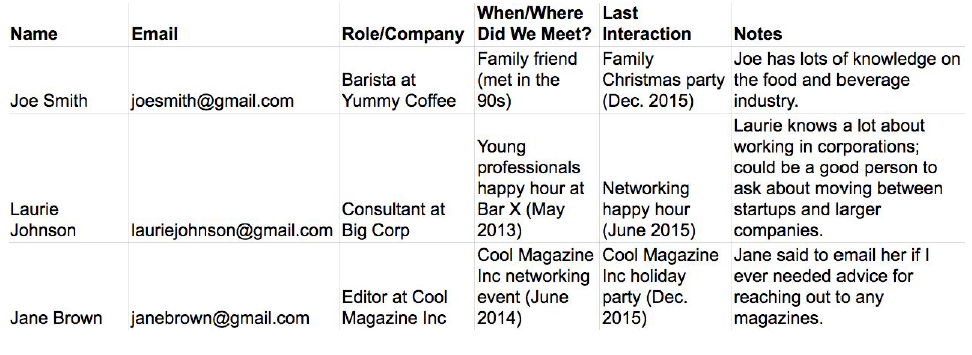People are always talking about how getting your career started and moving up the ladder is all about who you know, but what if you don’t know anyone?
The good news: You’re definitely not alone.
The other good news: Building your network from scratch doesn’t have to take several hours every day. Instead, try using these five easy methods for creating a network that people will call #squadgoals.
1. Create a List of Everyone Who Could Be in Your Professional Network
I know what you’re thinking: “I can’t create a list of professional contacts! I don’t have any!,” but unless you’ve spent your entire life living off the land in a cave by yourself, chances are you’ve come into contact with other humans…right?
Here’s the kicker: Every person you’ve met and will continue to meet has the potential to be part of your professional network. Do you have any close friends who work in the same industry as you? Add them to your list, or maybe you have family friends, professors or alumni whom you’ve leaned on for mentorship and support in the past. They get a spot, too. Any employers or coworkers from previous jobs or internships? Put ‘em on there as well.
What should this list look like? Create a simple Google Spreadsheet that includes each person’s name, current role and company, contact information, where/how you met them, the last time you interacted with them and any other notes about your professional relationship.
The good news is, building and maintaining a network from scratch doesn’t have to be a huge puzzle. If you’re proactive and thoughtful, you’d be surprised how quickly things can go your way.

While you don’t need to be overly detailed (“Tweeted at Joe Smith on April 24, 2016 at 5:10am”), it’s helpful going forward to see which contacts you haven’t reached out to in a while (say hey before the connection goes cold) and also who you can reach out to for what.
Pro tip: Make sure you’re reaching out to everyone in your network roughly three times per year. Even if it’s a quick check-in, that’s way better than no contact at all.
2. Contact Your Network the Right Way
One of the biggest mistakes young people make when it comes to building and maintaining a network is not knowing when or how to contact professional contacts when they need something.
Some quick networking etiquette for reaching out to your network:
- Make your ask small and manageable. Don’t ask a contact for a job right off the bat or to figure out your career path for you.
- Keep your email short (five sentences tops).
- Steer clear of emailing with several requests in a row.
- Be mindful of other people’s time and also what needs they might have.
- Offer them an out.
What should you do instead? As I mentioned above, if you’re staying in touch with your network, reaching out should be no big deal.
What a Template of Your Email Looks Like
Here’s what the outreach email can look like:
Hi [name],
It was so great chatting about [topic you discussed] at [place you interacted]! As always, your thoughts were on point and exactly what I needed to hear.
I have a very quick favor to ask you. I’m [explain in 1-2 sentences] and would really appreciate your help with [explain in 3-4 words]. If you’re able to hop on a quick 10-minute call to discuss, that’d be amazing, or if it’s easier to answer over email, that’d be helpful too.
I totally understand that you’re really busy, so it’s okay if you can’t take this on right now! Either way, I’d love to go out for coffee and catch up soon.
Best,
[Your name]
What Your Email Looks Like in Practice
Here’s what that email looks like when filled out:
Hi James,
It was so great chatting about your start in software engineering at Wesleyan’s alumni event last weekend! As always, your thoughts were on point and exactly what I needed to hear.
I have a very quick favor to ask you. I’m about to have my first technical interview next Thursday and would really appreciate your help going through the basics of how technical interviews work. If you’re able to hop on a quick 10-minute call to discuss, that’d be amazing, or if it’s easier to answer over email, that’d be helpful too.
I totally understand that you’re really busy, so it’s okay if you can’t take this on right now! Either way, I’d love to go out for coffee and catch up soon.
Best,
Lily
What a Template of Your Email Looks Like
If you haven’t reached out to someone in your network in a long time, make sure you acknowledge that you haven’t been in contact in a while, and also make sure that your ask is small.
Hi [name],
Long time, no talk! I’ve been busy [explain your situation in 3-4 words] and it looks like you’ve been doing huge things at [explain their situation in 3-4 words].
I have a very quick favor to ask you. I’m [explain in 1-2 sentences] and would really appreciate your help. If you’re able to hop on a quick 10-minute call to discuss, that’d be amazing, or if it’s easier to answer over email, that’d be helpful too.
I totally understand that you’re really busy, so it’s okay if you can’t take this on right now! Either way, I’d love to go out for coffee and catch up soon.
Best,
[Your name]
What Your Email Looks Like in Practice
Here’s that email when filled out:
Hi Carly,
Long time, no talk! I’ve been busy finishing up my senior year and handing in my thesis (more about this on WayUp), and it looks like you’ve been doing huge things at Google (congrats on the big product launch!).
I have a small favor to ask you. I’m looking at applying for several engineering jobs, but I’m nervous about how technical recruiting works for full-time positions. Since you worked as a university recruiter and dealt with these scenarios all the time from a hiring manager’s perspective, I would really appreciate your help going through the basics of how these parts of the hiring process work. If you’re able to meet up for coffee or hop on a quick 15-minute call to discuss, that’d be amazing, or if it’s easier to answer over email, that’d be helpful too.
I totally understand that you’re really busy, so it’s okay if you can’t take this on right now! Either way, I’d love to go out for coffee and catch up soon.
Best,
Lily
Trust me: There’s nothing worse than getting an email from someone you haven’t spoken to in a year that says, “Hey! We haven’t talked in a year! Get me a job at your company!” Not a good look.
3. Master the Cold Pitch
Once you’ve found your footing with the people you already know, how do you reach out to people you don’t? WayUp’s co-founder and CEO Liz Wessel is a huge fan of cold email pitching, and she’s onto something: Cold email pitching is a surprisingly effective way to meet new people and get further in your career. Why does it get a bad rap? Often people just don’t do it right.
When you’re emailing someone you’ve never talked to before, there are 3 key things to keep in mind:
- Keep your actual email short (five sentences tops).
- Make your request small, simple and straightforward.
- Offer the person an out.
What a Template of Your Email Looks Like
Hi [person’s first name],
I’ve been a huge fan of your work at [person’s company] for a while, particularly your recent work on [specific project or initiative]. I also saw that [insert 5-7 words about any other points of connection, like being an alma mater or how you worked on something similar].
I’m a [explain your situation in 3-5 words], and since this is in your wheelhouse, I was wondering if it would be possible to [short one-sentence request]. I’d love to meet for coffee or hop on a quick 15-minute call to discuss, whatever’s easiest for you. I also understand that you’re busy; if there’s a better time for me to follow up, let me know.
Thanks so much for your time, and if you need any other info, feel free to have a look at my WayUp profile [link to profile]!
Best,
[Your name]
What Your Email Looks Like in Practice
Hi Abby,
I’ve been a huge fan of your work at Teen Vogue for a while, particularly your recent four-part installment on college party culture. It was such an eye-opening read, and as someone who’s covered the college beat in the past, I know how much work it took.
I’m a recent grad who’s looking at two potential career paths in magazines, and because you’re so knowledgeable about the world of magazine journalism, I was hoping to get your opinion on if it’s better to start in print or digital when it comes to working at a magazine.
I’m New York-based, so I’d love to buy you coffee or hop on a quick 15-minute call to discuss, whatever’s easiest for you. I also understand that you’re busy; if there’s a better time for me to follow up, let me know.
Thanks so much for your time, and if you need any other info, feel free to have a look at my WayUp profile!
Best,
Lily
Time to rack up those contacts.
4. Use Your Social Media for Professional Good
Speaking from personal experience, during my four years of college, I was based in Middletown, Connecticut, a periphery suburb of Hartford, and while I liked my time at Wesleyan, central Connecticut isn’t the most happening place for networking, especially if you’re looking to connect with professionals primarily in New York and San Francisco.
How’d I get around it? One word: Twitter. I joined Twitter chats, tweeted out links to stories and articles I found interesting, and interacted with as many people on the platform as possible. Unsurprisingly, after nearly two and a half years as an active user, I’d venture to say that I met 70% of my network online (and probably 50% of my friends, if I’m being honest).
While I’m not saying you need to follow what I did to a T, the lesson is simple: Social media, whether it’s Twitter, Instagram, Facebook, LinkedIn or another network, is an easy, free way to build your network at your own pace. It isn’t just for personal use, and it can get you light-years ahead.
5. Help Other People as Much as Possible
When you’re trying to build your own network, it’s easy to get caught up in what you need and what your own career looks like. One of the most important things you can do as you continue to add more people to your list is to make sure you’re helping out your contacts as much as possible.
Feel like you don’t have anything to offer others as a young person? Think again. Often people are looking to others for small favors, like posting about an exciting opportunity on social media or inviting some friends to an event their company is throwing.
These small favors add up and make you a valuable connection for other people, so the sooner you start offering your help to people, the easier it is to build your network and also create an army of people willing to go to bat for you in the future.







